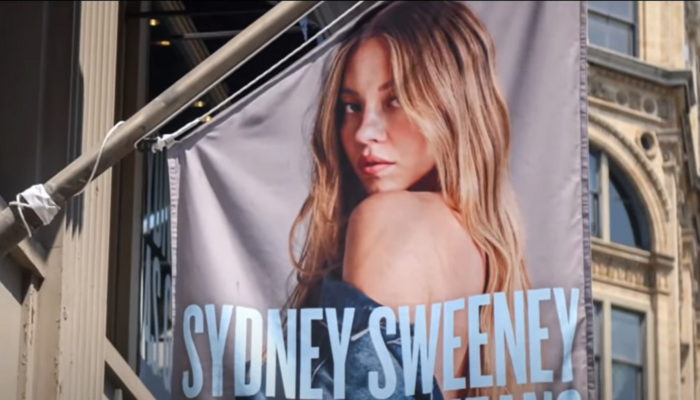


The New York Times on Friday arrogantly proclaimed that the controversy over all-American model Sydney Sweeney’s supposedly eugenics-related “good genes” advertisement for American Eagle brand jeans was ginned up by right-wing media: “Right-Wing Squawks Led To American Eagle Ad Fuss.”
The online headline deck: “How the Right Shaped the Debate Over the Sydney Sweeney Ads -- Right-wing commentators suggested there was widespread criticism of Ms. Sweeney over her new ad campaign. There wasn’t, at least at first.”
The main source of controversy was this 15-second ad released online July 23, featuring blue-eyed Sweeney and her blue jeans. Sweeney’s breathy delivery in full: "Genes are passed down from parents to offspring, often determining traits like hair color, personality, and even eye color. My jeans are blue."
In other words, it was harmless pun on the words "genes" and "jeans." And then certain woke corners of the left and the media went ballistic, accusing American Eagle of promoting Nazi-style eugenics -- and learned that it’s not 2020 anymore, as most people laughed off the attempts to make the ad offensive "eugenics," and American Eagle refused to be roped into the debate.
Times reporters Ken Bensinger, who covers media and politics, and Stuart Thompson, a disinformation reporter (!) tried hard to hide that the left had once again made itself look ridiculous by getting on the hysteric side of a cultural issue, insisting:
In reality, most progressives weren’t worked up much at all.
Criticism of the ad campaign had come almost entirely from a smattering of accounts with relatively few followers, according to an analysis of social media data by The New York Times. Conversation about the ad did not escalate online or in traditional media until days later, after right-leaning influencers, broadcasters and politicians began criticizing what they described as a wave of progressive outrage.
They whined about the mean right wing.
But it also shows how, on today’s internet, a controversy can sometimes be described as widespread when it isn’t. Instead, people pushing an agenda can cherry-pick from the tens of millions of posts and videos uploaded to social media every day to make their case.
The political right has become particularly adept at this tactic, cognizant of the way that tapping into hot-button cultural issues can stoke popular anger not just against progressive ideas but against the Democratic Party itself.
Odd then that both the Times itself and National Public Radio quickly found the Sweeney ad newsworthy, right-wing influence or not.
NPR jumped in on the July 29 Morning Edition, less than a week after the advertisement’s July 23 online debut (the ad also appeared on a billboard in Times Square).
The campaign has sparked backlash online. Some social media users have accused American Eagle of teasing at eugenics, a discredited scientific theory popular among white supremacists that the human race could be improved by breeding out less desirable traits.
An August 1 All Things Considered story with four bylines was headlined “The ad campaign that launched a thousand critiques: Sydney Sweeney's jeans.” Contra the Times, apparently lots of folks were criticizing the ad by August 1.
At the Times, opinion writer and language maven John McWhorter arrived first with a thoughtful July 29 think piece (which appeared July 31 under the distorting headline “Do These Jeans Make My Ad Look Racist?”).
Times journalist Yola Mzizi posted on August 1 (in print August 7):
The ad, which quickly took off online, set off controversy when some social media users felt it veered uncomfortably close to promotion of eugenics and the glorification of whiteness…..
MSNBC got in on the act back on July 28 with a crazed opinion piece (“Sydney Sweeney's ad shows an unbridled cultural shift toward whiteness”), and ABC’s Good Morning America First Look followed up in the early morning of July 29.
In other words, the Sidney Sweeney "eugenics" jeans/genes controversy wasn’t some right-wing disinformation plot but was organically conceived nonsense from mainstream journalists.
